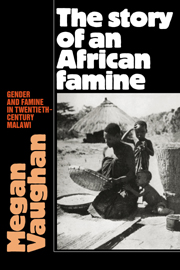Book contents
- Frontmatter
- Contents
- List of maps
- List of illustrations
- Preface
- Glossary
- Introduction
- 1 The 1949 famine
- 2 Famine as a Malthusian crisis
- 3 Famine as a failure of the market
- 4 Food entitlement and employment
- 5 Gender and famine
- 6 After the famine: a conclusion
- Notes
- List of oral interviews
- Bibliography
- Index
2 - Famine as a Malthusian crisis
Published online by Cambridge University Press: 05 November 2009
- Frontmatter
- Contents
- List of maps
- List of illustrations
- Preface
- Glossary
- Introduction
- 1 The 1949 famine
- 2 Famine as a Malthusian crisis
- 3 Famine as a failure of the market
- 4 Food entitlement and employment
- 5 Gender and famine
- 6 After the famine: a conclusion
- Notes
- List of oral interviews
- Bibliography
- Index
Summary
Most European observers in Malawi claimed not to be at all surprised by the advent of the 1949 famine. For them this was the predictable climax to a crisis in food production which had been gathering momentum in the 1940s. The theory that the famine was due first and foremost to ecological deterioration brought about by population pressure and destructive African farming practices was a popular one amongst government officials both in the districts and in the Department of Agriculture. This chapter examines the applicability of that theory to the 1949 famine, in the light of historical evidence of changing agricultural systems, population movements, and the notion of ‘subsistence’.
As I indicated in the Introduction, neo-Malthusian theories are popular in explaining Africa's present-day food supply problems. In colonial Malawi such theories had been current since the imposition of colonial rule in the 1890s. William Beinart (Beinart, 1984) has described in detail the origins of these ideas and their application to Southern Africa in the first part of the twentieth century, and in particular has pointed out how they provided a rationale for greater intervention in peasant agriculture in the 1930s and 1940s. David Anderson has described a similar process for Kenya (Anderson, 1984); and Paul Richards has examined the same ideas and their use in ‘development thinking’ in Africa as a whole (Richards, 1983).
In colonial Malawi a commonplace of European thought since the 1890s was that African farming practices were dangerously destructive of the environment.
- Type
- Chapter
- Information
- The Story of an African FamineGender and Famine in Twentieth-Century Malawi, pp. 50 - 76Publisher: Cambridge University PressPrint publication year: 1987



